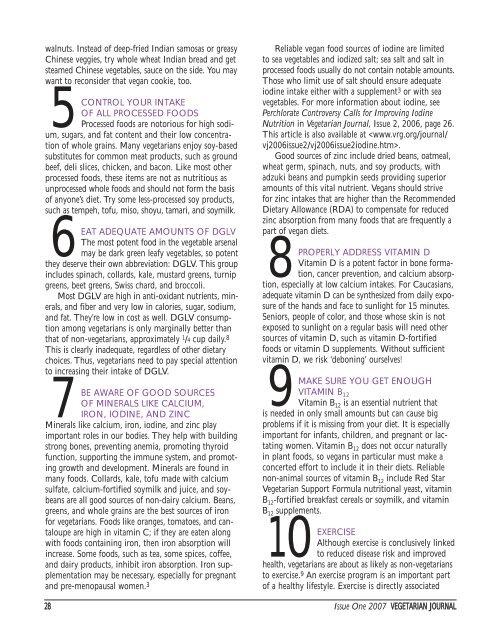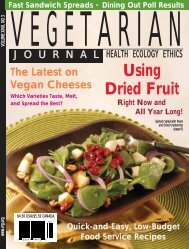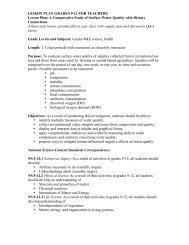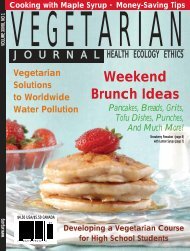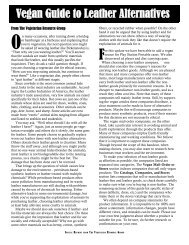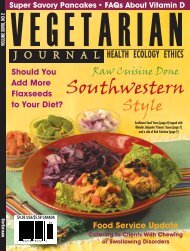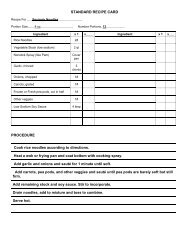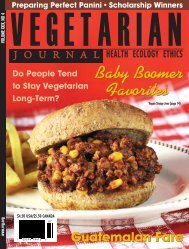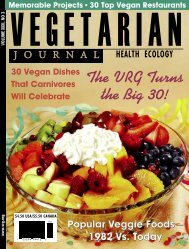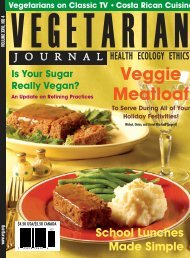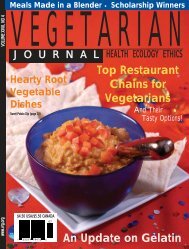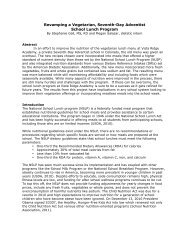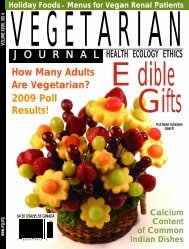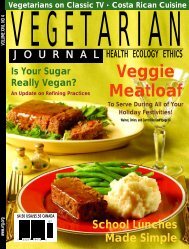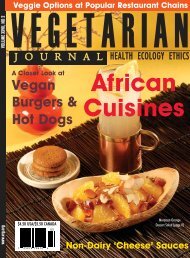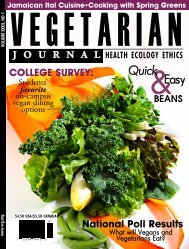Vegan Thickeners - The Vegetarian Resource Group
Vegan Thickeners - The Vegetarian Resource Group
Vegan Thickeners - The Vegetarian Resource Group
You also want an ePaper? Increase the reach of your titles
YUMPU automatically turns print PDFs into web optimized ePapers that Google loves.
walnuts. Instead of deep-fried Indian samosas or greasy<br />
Chinese veggies, try whole wheat Indian bread and get<br />
steamed Chinese vegetables, sauce on the side. You may<br />
want to reconsider that vegan cookie, too.<br />
5CONTROL YOUR INTAKE<br />
OF ALL PROCESSED FOODS<br />
Processed foods are notorious for high sodium,<br />
sugars, and fat content and their low concentration<br />
of whole grains. Many vegetarians enjoy soy-based<br />
substitutes for common meat products, such as ground<br />
beef, deli slices, chicken, and bacon. Like most other<br />
processed foods, these items are not as nutritious as<br />
unprocessed whole foods and should not form the basis<br />
of anyone’s diet. Try some less-processed soy products,<br />
such as tempeh, tofu, miso, shoyu, tamari, and soymilk.<br />
6EAT ADEQUATE AMOUNTS OF DGLV<br />
<strong>The</strong> most potent food in the vegetable arsenal<br />
may be dark green leafy vegetables, so potent<br />
they deserve their own abbreviation: DGLV. This group<br />
includes spinach, collards, kale, mustard greens, turnip<br />
greens, beet greens, Swiss chard, and broccoli.<br />
Most DGLV are high in anti-oxidant nutrients, minerals,<br />
and fiber and very low in calories, sugar, sodium,<br />
and fat. <strong>The</strong>y’re low in cost as well. DGLV consumption<br />
among vegetarians is only marginally better than<br />
that of non-vegetarians, approximately 1 /4 cup daily. 8<br />
This is clearly inadequate, regardless of other dietary<br />
choices. Thus, vegetarians need to pay special attention<br />
to increasing their intake of DGLV.<br />
7BE AWARE OF GOOD SOURCES<br />
OF MINERALS LIKE CALCIUM,<br />
IRON, IODINE, AND ZINC<br />
Minerals like calcium, iron, iodine, and zinc play<br />
important roles in our bodies. <strong>The</strong>y help with building<br />
strong bones, preventing anemia, promoting thyroid<br />
function, supporting the immune system, and promoting<br />
growth and development. Minerals are found in<br />
many foods. Collards, kale, tofu made with calcium<br />
sulfate, calcium-fortified soymilk and juice, and soybeans<br />
are all good sources of non-dairy calcium. Beans,<br />
greens, and whole grains are the best sources of iron<br />
for vegetarians. Foods like oranges, tomatoes, and cantaloupe<br />
are high in vitamin C; if they are eaten along<br />
with foods containing iron, then iron absorption will<br />
increase. Some foods, such as tea, some spices, coffee,<br />
and dairy products, inhibit iron absorption. Iron supplementation<br />
may be necessary, especially for pregnant<br />
and pre-menopausal women. 3<br />
Reliable vegan food sources of iodine are limited<br />
to sea vegetables and iodized salt; sea salt and salt in<br />
processed foods usually do not contain notable amounts.<br />
Those who limit use of salt should ensure adequate<br />
iodine intake either with a supplement 3 or with sea<br />
vegetables. For more information about iodine, see<br />
Perchlorate Controversy Calls for Improving Iodine<br />
Nutrition in <strong>Vegetarian</strong> Journal, Issue 2, 2006, page 26.<br />
This article is also available at .<br />
Good sources of zinc include dried beans, oatmeal,<br />
wheat germ, spinach, nuts, and soy products, with<br />
adzuki beans and pumpkin seeds providing superior<br />
amounts of this vital nutrient. <strong>Vegan</strong>s should strive<br />
for zinc intakes that are higher than the Recommended<br />
Dietary Allowance (RDA) to compensate for reduced<br />
zinc absorption from many foods that are frequently a<br />
part of vegan diets.<br />
8PROPERLY ADDRESS VITAMIN D<br />
Vitamin D is a potent factor in bone formation,<br />
cancer prevention, and calcium absorption,<br />
especially at low calcium intakes. For Caucasians,<br />
adequate vitamin D can be synthesized from daily exposure<br />
of the hands and face to sunlight for 15 minutes.<br />
Seniors, people of color, and those whose skin is not<br />
exposed to sunlight on a regular basis will need other<br />
sources of vitamin D, such as vitamin D-fortified<br />
foods or vitamin D supplements. Without sufficient<br />
vitamin D, we risk ‘deboning’ ourselves!<br />
9MAKE SURE YOU GET ENOUGH<br />
VITAMIN B 12<br />
Vitamin B 12 is an essential nutrient that<br />
is needed in only small amounts but can cause big<br />
problems if it is missing from your diet. It is especially<br />
important for infants, children, and pregnant or lactating<br />
women. Vitamin B 12 does not occur naturally<br />
in plant foods, so vegans in particular must make a<br />
concerted effort to include it in their diets. Reliable<br />
non-animal sources of vitamin B 12 include Red Star<br />
<strong>Vegetarian</strong> Support Formula nutritional yeast, vitamin<br />
B 12 -fortified breakfast cereals or soymilk, and vitamin<br />
B 12 supplements.<br />
10EXERCISE<br />
Although exercise is conclusively linked<br />
to reduced disease risk and improved<br />
health, vegetarians are about as likely as non-vegetarians<br />
to exercise. 9 An exercise program is an important part<br />
of a healthy lifestyle. Exercise is directly associated<br />
28 Issue One 2007 VEGETARIAN JOURNAL


